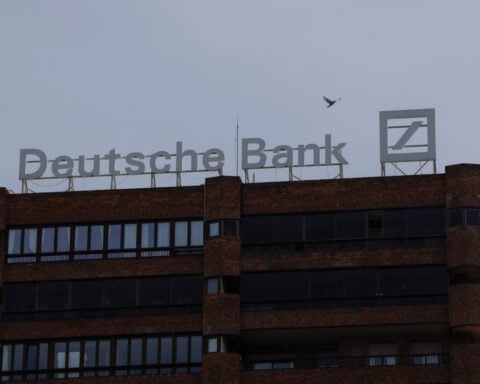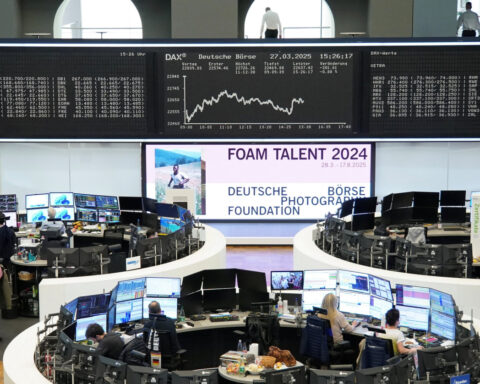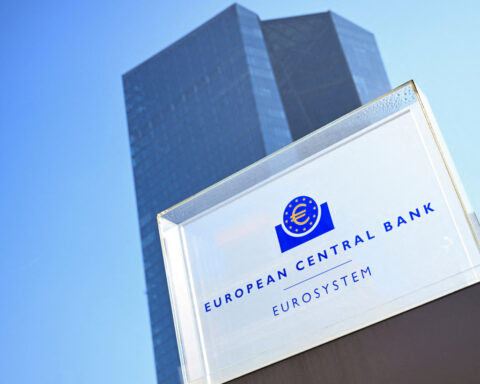(Reuters) - U.S. President Donald Trump's sweeping tariffs on Mexico, Canada and China over the weekend, impending U.S. jobs data and assessment of the new AI landscape ahead of major tech firms' corporate results set the tone for financial markets.
The Bank of England has an interest rate decision, and European lenders will also publish their results.
Here's your guide to the week ahead in global markets from Kevin Buckland in Tokyo, Saqib Ahmed and Lewis Krauskopf in New York, and Tommy Wilkes and Amanda Cooper in London.
1/T DAY
From bond investors and currency traders to Fed officials and foreign powers, everybody is evaluating the potential fallout of Trump's tariffs.
Trump on Saturday imposed 25% tariffs on Mexican and most Canadian imports and 10% on goods from China starting on Tuesday.
Canada has said it would respond with 25% tariffs against $155 billion of U.S. goods. Mexico has also said it plans retaliatory tariffs and China has vowed countermeasures.
The response from the world's second biggest economy will be in focus for markets as China returns this week from Lunar New Year festivities.
And in Europe, investors are reassessing the view that heightened trade tensions could be avoided.
2/SHOULD I STAY OR SHOULD I GO?
The monthly U.S. jobs report on Feb. 7 comes as investors assess the prospects for further interest rate cuts and how dramatic new Trump administration policies could reshape the labour market.
December's blowout jobs report raised doubts about whether the Fed would have room to ease monetary policy further and sent Treasury yields shooting higher. Encouraging inflation data did calm market fears, but a hot January jobs report could change all that.
Fed Chair Jerome Powell said he was in no rush to cut rates again until inflation and jobs data make it appropriate.
The big unknown though is Trump's labour market agenda, including an immigration crackdown and plans to slash the federal workforce, with the White House offering 2 million federal employees financial incentives to quit.
3/TECH-TONIC SHIFTS
Investors have long speculated about what might eventually slow the AI-investment steamroller and now have a new perspective to consider: The emergence of China AI sensation DeepSeek, which has overturned assumptions about the computing power and investment needed to create state-of-the-art models. This shift pummelled Nvidia's stock, inflicting a record loss in market value. But DeepSeek is also challenging the broader dominance of U.S. technology, raising questions about the competitive advantages of the top seven tech stocks, dubbed the Magnificent Seven. With upcoming earnings reports from Mag 7 members Alphabet on Tuesday and Amazon on Thursday, investors will have the chance to determine whether recent AI market volatility is a warning of future challenges or an opportunity to reinvest in this rapidly growing sector.
4/IN FOR A SQUEEZE
European bank earnings pick up pace this week, with French lenders BNP Paribas, Societe Generale and Credit Agricole, Switzerland's UBS and Spain's Santander all reporting fourth-quarter numbers.
Most lenders are expected to have still wrung enough extra cash out of higher interest rates - helped by soaring investment banking revenues - to boost their profits and keep a two-year-long share price rally rolling on. Investors will listen for any hints that a recent burst of deal-making has further to run.
Still, challenges loom. Falling interest rates mean pressure on the difference between what banks earn on loans and what they pay on deposits, and there is economic weakness at home just as the U.S. economy powers ahead.
Germany's Deutsche Bank gave some cause for concern when it reported a sharp drop in profits and ditched a key goal on costs, sending its shares lower.
5/DECISION TIME
The Bank of England meets on Thursday to set interest rates. Markets aren't quite fully pricing in a quarter-point cut, but economists seem to think that is the likely outcome.
UK data is weakening - multiple measures of employment show cracks appearing in the labour market, and consumer spending unexpectedly shrank in the key holiday shopping period. Growth flatlined in the third quarter of 2024 and the BoE expects the same in the last one.
Several banks see the British economy struggling to expand by even 1% this year, in spite of finance minister Rachel Reeves' plans to revitalise growth.
And there's the matter of the bond market turmoil earlier this month, which pushed the government's 10-year borrowing costs to their highest since 2008. Gilt yields have since retreated, but remain uncomfortably above 4.5% - more than any G10 economy bar New Zealand.
(Graphics credits to Sumanta Sen, Vineet Sachdev, Prinz Magtulis and Kripa Jayaram, Additional reporting by Dhara Ranasinghe ; Compiled by Karin Strohecker; Editing by Frances Kerry and Bernadette Baum)

 Trump has begun another trade war. Here's a timeline of how we got here
Trump has begun another trade war. Here's a timeline of how we got here
 Canada's leader laments lost friendship with US in town that sheltered stranded Americans after 9/11
Canada's leader laments lost friendship with US in town that sheltered stranded Americans after 9/11
 Chinese EV giant BYD's fourth-quarter profit leaps 73%
Chinese EV giant BYD's fourth-quarter profit leaps 73%
 You're an American in another land? Prepare to talk about the why and how of Trump 2.0
You're an American in another land? Prepare to talk about the why and how of Trump 2.0
 Chalk talk: Star power, top teams and No. 5 seeds headline the women's March Madness Sweet 16
Chalk talk: Star power, top teams and No. 5 seeds headline the women's March Madness Sweet 16
 Purdue returns to Sweet 16 with 76-62 win over McNeese in March Madness
Purdue returns to Sweet 16 with 76-62 win over McNeese in March Madness







